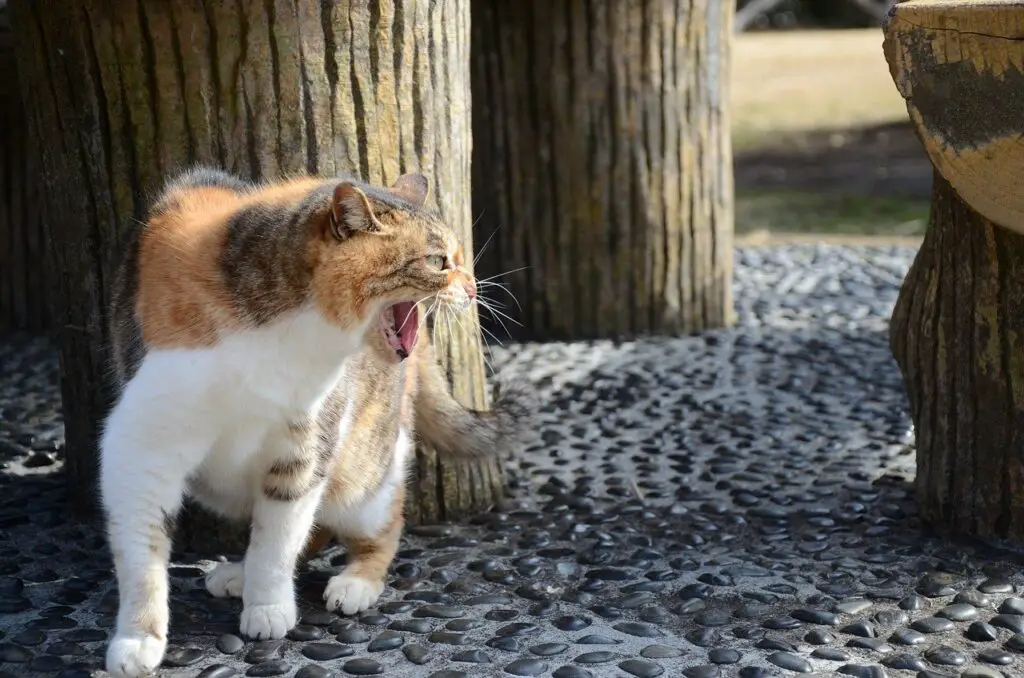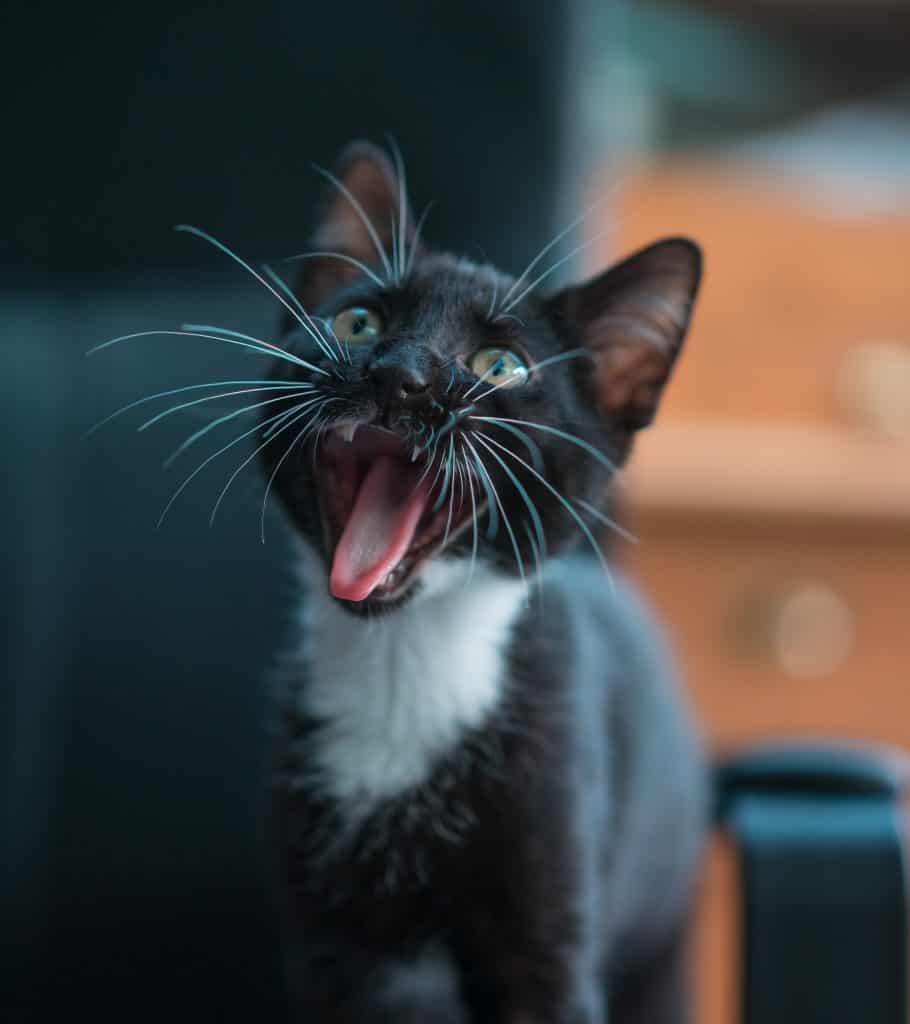We hope you like the products we recommend! Just so you know this post contains affiliate links and I will be compensated if you make a purchase after clicking our links.
Cats use a range of vocalizations to tell us and other cats what they want or need. We’re all familiar with meowing and purring, two of the most pleasant and pleasing sounds cats make, but why do cats cry like a baby at night?
It can be quite unsettling to hear and is made more so by the fact that it sometimes sounds like a baby’s cry.
Some owners call it a cry, but we’d call it more of a caterwaul or yowl: a drawn-out meow-sound that can rise quickly in pitch and volume. All breeds are capable of making this odd noise but why do cats cry like a baby at night?
Why do cats cry like a baby at night?
Cats use vocalizations to communicate with their owners and other cats. Crying is one way to convey a message both to the recipient and to anyone within earshot.
One of the most common reasons that female cats cry at night is because she’s looking for a mate. She’s signaling to males in the vicinity that she wants to hook up. Remember that cats don’t have Tinder or the opposable thumbs to slide into someone’s DMs.
Get your cat neutered to stop this.
It’s uncomfortable for the cat and it can be hard for the owner to listen to, too. Living with a sexually frustrated female will mean regular crying and could lead to multiple pregnancies. Unspayed females can go into heat from 4-months old and during the breeding season, once every 3 weeks.
As cats are more active at dawn and dusk, a female in heat is likely to disrupt sleeping patterns inside your house.
We’ve experienced this with the rescue cat we adopted. She’d already had a litter of kittens in foster care so we thought we had time to spare. Unwell and underweight, she needed some TLC before her spaying. Within a few weeks of arriving, she was yowling like a banshee in the window and rubbing herself on every surface she could find. Once she’d been spayed, the caterwauling stopped.
Female cats do it when they’re in heat. Male cats do it when they can smell a female in heat and it sounds just as awful.

Cat Fight
If you can hear a cat crying a night, then you may have stumbled into a turf war between rivals. Cats yowl at each other when one comes onto the territory of another. You might also hear hissing and growling, too. Sometimes this can turn into a physical fight or if one successful intimidates the other, it could come to nothing.
Cats are very territorial so if you’ve recently moved house you may find that your cat is suddenly more vocal. Upset, irritated, disorientated or distressed at its loss of place, the cat may need time to settle into his or her new environment. This can happen both to indoor and outdoor cats. Once the cat is settled, the behavior should stop but there are several things an owner can do to help a cat adjust to its new surroundings including using synthetic hormone sprays and diffusers.
Indoor cats may also yowl because they can see another cat outside but can’t get to them. Keep a lookout for strays, other neighborhood cats or ferals that may be hanging around and stressing your cat out. There are several ways to discourage cats from coming into your garden and this may help reduce the anxiety of your indoor cat.
Illness or Injury
Illness and injury can cause cats to cry or yowl for no obvious reason. If the behavior is unexplained or sudden, make an appointment with a veterinarian to rule out any physical causes behind the noise-making. Pay attention to the time and place it happens. Keeping a diary will be helpful so that you can find any patterns and discuss them with a veterinarian.
She Wants Attention
Some cats yowl to make demands on their humans: let
me outside, let me back inside or give me more food, etc. If your cat doesn’t like its carrier, then you may be familiar with wailing as a form of protest. Bored cats can be vocal cats, too. You might notice this more in outdoor cats who are temporarily being kept inside following a house move or when they’re recuperating from an injury.
Make sure there are plenty of toys to stimulate their mind and instinct. We’ve
found that window perches can be useful especially if you have a lot of
native birdlife in your garden.
There are outdoor enclosures you can buy to give indoor or recuperating cats some outside time. You can also take indoor cats outside in a stroller to give them something else to do. Cats recovering from illness or injury might benefit from wearing a leash or harness around the garden for fresh air.
Cats work to a different schedule than humans. They’re most active around dawn and dusk which is why you’re more likely to hear yowling during the early hours.
Elderly Cats
Cats suffering from mental decline may start crying, too. This is because they’re disorientated or distressed. Unfortunately, cats can get, too. If your cat is making strange noises, it’s a good time to talk to a veterinarian.
Cats can become also become disorientated and anxious if they start losing their hearing or eyesight. Crying at night is more common in older cats who may not recognize their surroundings as easily in the dark.
Cats crying at night superstition
We adopted a gorgeous black cat so we’re used to hearing about superstitions. Some cultures believe that a crying cat outside a house means that someone inside is going to die. It’s not hard to imagine how this came about: think about how many
unneutered cats there must have been years ago. They were probably crying outside everyone’s house during mating season! The unsettling noise they made would only have made the superstition more believable to people.
There’s also a spiritual belief amongst some circles that cats are warning owners about nearby spirits or entities. Your belief in this may depend on how open
you are to the supernatural. Certainly, cats have a long history with sensing energies for those who believe in it.
If your cat is yowling like a baby at night, don’t ignore it.
Look for why they’re doing it. If they’re unspayed, now is a good
time to book an operation. Not only will it reduce the cat’s chance of getting certain diseases but it will stop the yowling. Some owners get a little funny at the thought of doing this but imagine being that sexually frustrated multiple times a year. If you have an outdoor cat, then spaying or neutering is the right thing to do to reduce the
number of unwanted cats ending up in shelters.
Check to see if your indoor cat is being bothered by other cats, too.
If there’s no obvious cause, take the cat to a veterinarian who will be able to advise you on behavioral causes once he or she has ruled out any physical ailments.

